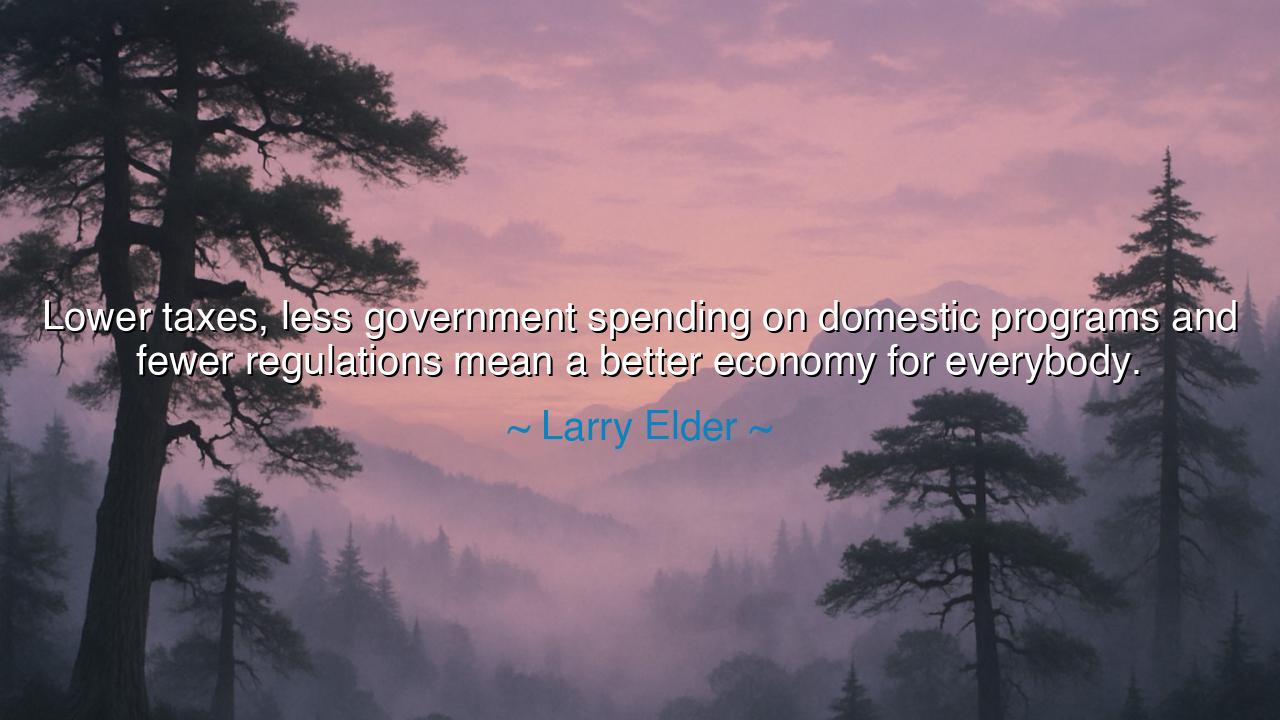
Lower taxes, less government spending on domestic programs and
Lower taxes, less government spending on domestic programs and fewer regulations mean a better economy for everybody.






"Lower taxes, less government spending on domestic programs and fewer regulations mean a better economy for everybody." – Larry Elder
In these clear and unwavering words, Larry Elder, the American commentator and advocate for limited government, speaks the philosophy of self-reliance and economic freedom. His statement cuts through political rhetoric to strike at an ancient truth: prosperity flourishes not under the weight of control, but in the air of liberty. Elder’s words are not a mere argument for policy—they are a declaration of faith in the individual, in human ingenuity, and in the sacred balance between government restraint and personal responsibility.
The origin of this quote arises from Elder’s broader worldview shaped by the principles of classical liberalism and free-market economics. Like many thinkers before him—from Adam Smith, who wrote of the “invisible hand” of enterprise, to Milton Friedman, who warned against the dangers of state overreach—Elder believes that the true wealth of a nation springs not from central planning, but from the creativity of its citizens. His words were forged amid modern debates about taxation, welfare, and regulation, where he saw that good intentions often lead to dependency, stagnation, and the quiet erosion of freedom.
To understand the power behind his statement, one must look to history. Consider the economic renaissance of post-war America, when the burdens of wartime control were lifted and private industry was allowed to surge forward. Factories that once built tanks now built cars; workers who once followed orders became inventors and entrepreneurs. The spirit of competition unleashed innovation across every field—from medicine to technology to commerce. The government, having stepped back, allowed citizens to step forward. The result was a prosperity that lifted millions out of poverty and inspired the world. Elder’s words echo this lesson: less interference, more empowerment, yields growth for all.
Contrast this with nations that clung to central control. In the 20th century, the Soviet Union and its satellites promised equality through regulation and command. They planned every price, dictated every wage, and taxed ambition until it withered. The result was not fairness, but famine; not equality, but despair. The bureaucrats who sought to perfect the economy smothered it instead. The same truth holds wherever the state expands beyond its purpose: when government assumes the role of provider rather than protector, it breeds dependency and weakens the moral fabric of a people.
Elder’s philosophy is therefore not anti-government, but pro-limitation—the belief that government must be like a shepherd’s fence: strong enough to keep order, yet open enough to let the flock roam and grow. High taxes and excessive regulation, he warns, are not acts of protection but of paralysis. Every dollar the state takes is one less dollar for investment, creation, or generosity. Every rule that restrains honest enterprise is a barrier to progress. His message calls not for the destruction of government, but for its discipline—for leaders who remember that their duty is to enable, not to control.
Yet his quote also carries a moral undertone. Freedom is not license; it is responsibility. When citizens are given the space to build their own success, they must also bear the weight of their choices. Elder’s vision assumes a virtuous citizenry—people who work, create, and give, not because they are compelled, but because they are free. It is a vision rooted in dignity, where prosperity is earned, not granted; where wealth, once created, can be shared through voluntary charity rather than coerced redistribution.
The lesson, then, is eternal: when government grows too large, the soul of a people shrinks; when it withdraws to its proper place, the spirit of enterprise expands. A better economy is not crafted by decree—it is born from the sweat, courage, and creativity of free individuals. Elder’s words remind us that freedom, once lost to dependency, is difficult to regain, but when nurtured, it yields boundless fruit.
And so, the practical actions are these: work with integrity, not entitlement. Guard against policies that promise comfort but cost liberty. Support laws that protect fairness but reject those that stifle initiative. Be charitable by choice, industrious by nature, and vigilant against the slow creep of control. For in the balance between freedom and governance lies the destiny of every nation—and as Larry Elder teaches, the lighter the hand of government, the stronger the hand of the people.






AAdministratorAdministrator
Welcome, honored guests. Please leave a comment, we will respond soon